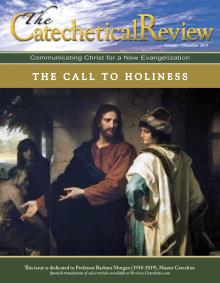Surely one of the most beautiful, one of the most enduring, and one of the most sublime teachings of Vatican II is the universal call to holiness in Lumen Gentium, chapter 5. I have never reread this chapter without feeling an increase of my own zeal for answering this call, even as I become more aware, at the same time, of how much I fall short. Still, it is so beautiful, it makes me want to persist.
But what is holiness? I want to suggest that it is not, in the first instance, a concept abstracted from concrete holy persons and holy things, a category into which they are fitted because they conform to its defining features. For holiness, as Lumen Gentium puts it, is nothing else but “the perfection of love (caritas)” (LG 39; cf. 42),[1] and there is nothing more concrete than this perfection, for it has as its content Jesus Christ, “love divine all loves excelling / joy of heaven to earth come down” (Charles Wesley). He, “together with the Father and the Spirit, is hailed as ‘alone holy’” (LG 39). The meaning of the word “holy” comes from him who is “alone holy,” not the other way around, as if the meaning of “holy” is established independently and God is then found to qualify.
The same is true for love. The Trinity is “alone holy” because the Trinity is “an eternal exchange of love” (CCC 221) such that “God is love” (1 Jn 4:8). The sentence is not reversible, to “Love is God,” which would invite us to fill in the content of “love” with whatever is currently fashionable on greeting cards and then to think that God is that. Luckily, the content of what Love is, and therefore what God is, and therefore what holiness is, is filled out for us concretely in Jesus Christ, who “loved the Church as his Bride, giving himself up for her so as to sanctify her” (see Eph 5:25-26; LG 39). The sacrifice of Christ on the Cross “‘for the sins of the whole world’ (1 Jn 2:2) expresses his loving communion with the Father” (CCC 606), since he “embraces in his human heart the Father’s love for human beings,” and loves us “to the end” (Jn 13:1; CCC 609).
This love is the only love that has not even the slightest taint of self-interest. It is the love that “emptied itself” of the “form of God,” and received the “form of a servant” (Phil 2:5). There can be no self-interest in this because God already has everything, is everything, he needs or wants; so, the self-emptying is pure gift. Only such a love can be the medium of true human communion. And if that weren’t enough, the Word not only “became flesh” (Jn 1:14) but also “sin” (2 Cor 5:21), meaning that he did not take on a human nature in its unfallen condition, as he was clearly entitled to, but rather took flesh under the conditions of the Fall, subject to suffering and death. Though sinless, he entered into solidarity with sinners, accepting our lot as his lot, thereby making us his, giving us a new solidarity in his love, so that we now have a new way of saying “we” as human beings that is no longer in “Adam” only but in his love, that of the Second Adam.
Baptism incorporates us into this new “we,” into being “his.”
The rest of this online article is available for current Guild members.
This article is from The Catechetical Review (Online Edition ISSN 2379-6324) and may be copied for catechetical purposes only. It may not be reprinted in another published work without the permission of The Catechetical Review by contacting [email protected]


















